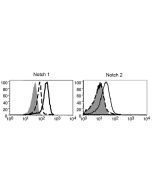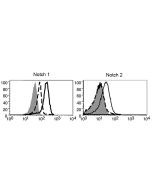Cookie Policy: This site uses cookies to improve your experience. You can find out more about our use of cookies in our Privacy Policy. By continuing to browse this site you agree to our use of cookies.
AdipoGen Life Sciences
anti-Notch1 (mouse), mAb (22E5) (Biotin)

| Product Details | |
|---|---|
| Synonyms | Neurogenic Locus Notch Homolog Protein 1; Motch A; mT14; p300 |
| Product Type | Monoclonal Antibody |
| Properties | |
| Clone | 22E5 |
| Isotype | Rat IgG2aκ |
| Source/Host | Purified from concentrated hybridoma tissue culture supernatant. |
| Immunogen/Antigen | Recombinant mouse Notch1:Fc (AG-40B-0109). |
| Label/Conjugates | Biotin |
| Application |
Flow Cytometry: (1:500) Immunofluorescence: (1:1000) (see Reference 1) |
| Crossreactivity | Mouse |
| Specificity |
Recognizes endogenous mouse Notch-1 receptor. |
| Purity | ≥95% (SDS-PAGE) |
| Purity Detail | Protein G-affinity purified. |
| Concentration | 0.5mg/ml |
| Formulation | Liquid. In PBS containing 0.02% sodium azide. |
| Shipping and Handling | |
| Shipping | BLUE ICE |
| Short Term Storage | +4°C |
| Long Term Storage | -20°C |
| Handling Advice |
After opening, prepare aliquots and store at -20°C. Avoid freeze/thaw cycles. |
| Use/Stability | Stable for at least 1 year after receipt when stored at -20°C. |
| Documents | |
| MSDS |
 Download PDF Download PDF |
| Product Specification Sheet | |
| Datasheet |
 Download PDF Download PDF |
Notch signaling pathway regulates many different cell fate decisions in both vertebrate and invertebrate species. There are 5 canonical Notch ligands in mammals: Jagged-1, Jagged-2, DLL1, DLL3 and DLL4. These can bind to the four Notch receptors Notch 1-4. It is important for pattern formation during development such as neurogenesis, angiogenesis or myogenesis and regulates T cell development and stem cell maintenance. Notch signaling is also involved in cellular processes through-out adulthood. Signaling via Notch occurs between neighbouring cells and both the receptor and its ligands are transmembrane proteins.
- Dynamic Regulation of Notch 1 and Notch 2 Surface Expression during T Cell Development and Activation Revealed by Novel Monoclonal Antibodies: E. Fiorini, et al.; J. Immunol.183, 7212 (2009)
- Cutting edge: Thymic NK cells develop independently from T cell precursors: V.S. Ribeiro, et al.; J. Immunol. 185, 4993 (2010)








